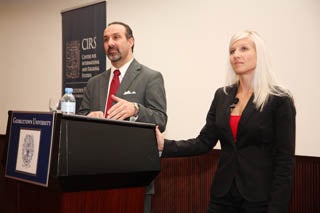Georgetown’s CIRS Puts the Spotlight on Environment Sustainability in Qatar and the Region During the Monthly Dialogue Series

Georgetown University in Qatar (GU-Q) on Monday held the first event of the Monthly Dialogue Series hosted by its Center for International and Regional Studies (CIRS) for the new academic year.
The well-attended event, where guests ranged from members of the diplomatic corp and academics to environment advocates and students, featured the University’s 2011-2012 Postdoctoral Fellow, Dr. Mari Luomi, who shared her ongoing research on environmental sustainability in the region.
During the lecture, titled “Natural Resources and Environmental Unsustainability in Qatar and the GCC,” Dr. Luomi urged a new way of conceptualizing and understanding the political economy, politics and development in the Gulf countries.
”The regional governments ‘dependence on fossil fuels, fossil fuel revenues, and the social contracts based on these revenues produces unsustainability,” said Dr. Luomi, in her opening argument.
The ‘business-as-usual’ of Gulf economies and societies is increasingly challenged by a number of environmental and natural resource-related pressures, she said.
“The most urgent ones originate from within the states: fossil fuel dependence, soaring population, economic growth, high per capita consumption and waste of natural resources, and social contracts that include abundant fuel and utility price subsidies. We live in a constructed illusion of plentiful and limitless natural resources,” said Dr. Luomi, who holds a PhD in Middle Eastern Studies from Durham University, UK.
Based on available data, Qatar’s share of total global carbon emissions stood at 0.2% in 2007, while it ranked the first when measured in per capita emissions. According to Qatar Petroleum the oil and gas industry made up the lion share of Qatar’s emissions, with close to 70% in 2006.
Qatar’s ecological footprint – indicator of human consumption in relation to the Earth’s resources – is also the world’s second largest.
“There are a number of areas in which Gulf governments can work to steer their societies towards sustainable futures. Among the most important ones are: embracing environmental sustainability as a cross-sectoral topic,” said Dr. Luomi.
Further ways to increase sustainability, she said, were building an ‘infrastructure for sustainability’, for example in the form of recycling infrastructure, better public transport coverage and setting up feed-in-tariffs for renewable energy.
“Most importantly, however, governments should open up a frank public debate on the environmental externalities, or negative impacts, of current patterns of natural resource consumption. This would pave way for the introduction of natural resource pricing that truly reflects this cost.”
“It is only when people are made to understand the cost of their lifestyles for the surrounding environment that we can start making a change,” she added.
CIRS director, Mehran Kamrava, said: “Through the Monthly Dialogue we’ve encouraged discourse on topical issues of the day, and bring to light research by members of the education community for the local community.”
Georgetown’s Center for International and Regional Studies in Qatar is a premier research institute devoted to the academic study of regional and international issues. CIRS sponsors a number of forums throughout the year facilitating dialogue and an exchange of ideas on a broad range of issues with the aim to engage and enrich the university students and community.